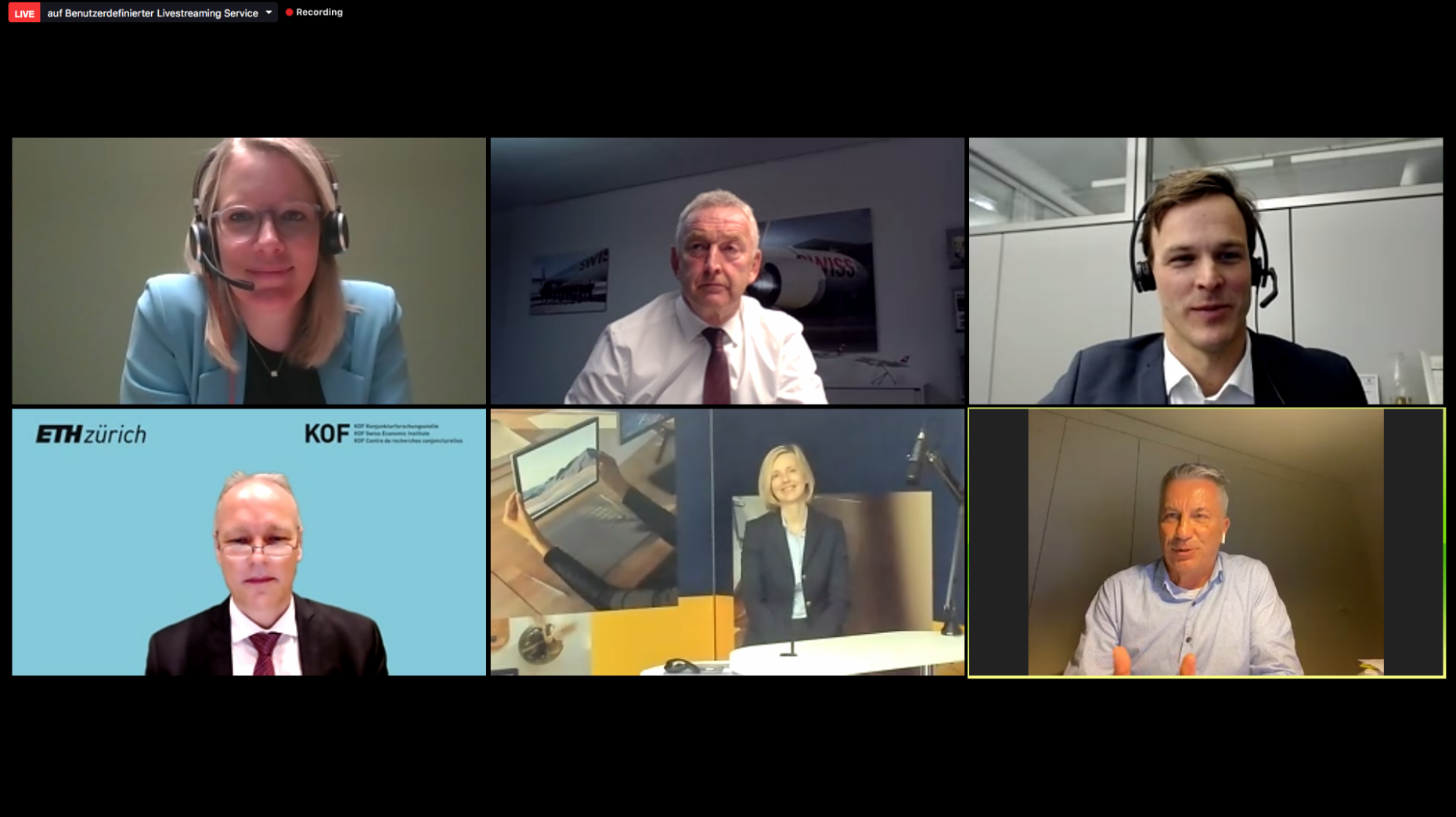KOF forecasting conference: "Major crises set things in motion"
- Events
- KOF Bulletin
Is the coronavirus crisis overshadowing the climate debate or is it playing into its hands? KOF’s forecasting conference on 22 October saw representatives from the worlds of business, politics and science discuss in a webinar how lost profits can affect green investment and what significance Swiss climate policy has internationally.

The coronavirus and climate crises both have the potential to turn into a disaster. Nevertheless, they are treated differently economically and politically. "At present, many people are fighting for survival. How to deal with the climate comes second for them," said Jan-Egbert Sturm, Director of KOF, in his introductory presentation. Since the outbreak of the virus, Switzerland has lost 40 billion Swiss francs in value added. Should a second lockdown follow, a further 30 billion francs could be added to this total, according to Sturm. The consequences are likely to be lasting: "Major crises set things in motion, making it difficult to return to the old growth path." Private consumption has returned to pre-crisis levels since the lockdown, but construction and equipment investment will take longer. "Like any form of structural change, environmentally friendly economic activity is not possible without investment." And the coronavirus crisis is making it difficult for companies to invest in the future.
This was confirmed by Thomas Klühr, CEO of Swiss International Air Lines Ltd. The use of fuel-efficient aircraft is key to reducing carbon emissions. "This will only work if we return to the profitability we had before COVID-19," said Klühr. Swiss Airlines had to reduce its flight schedule by 97 per cent in April, and Klühr expects to see a maximum load factor of 25 per cent over the next few months. "The world is closed for us – we cannot keep up with our business." Bookings plummet as soon as new quarantine restrictions are imposed or risk areas are identified. "Current developments are a nightmare in terms of flight planning."
Marianne Janik, CEO of Microsoft Switzerland, sounded more upbeat. "Coronavirus has taught us how important it is to operate based on data," she said. Individual citizens can handle data and scenarios that could be useful for the climate crisis. In the future, Microsoft will provide its partners with tools to enable them to make better decisions based on data. The technology company also plans to become carbon negative by 2030.
Companies underestimate the wishes of their stakeholders
Bastien Girod, Business Development Director at South Pole and Green National Councillor, called on companies to do the same as Microsoft. "Firms should consider all stakeholders, not just shareholders." In every stakeholder group, he said, there are actors who demand that companies cut their emissions to zero. "And companies often underestimate this."
At Swiss Re there appears to have been some movement in this respect. The reinsurer wants to have a completely climate-neutral investment portfolio by 2050. With capital investment of around 130 billion Swiss francs, its investment decisions carry some weight. "The climate crisis is a slowly evolving risk. Such risks are often masked by more acute ones, such as COVID-19," said Nora Ernst, Senior Sustainability Risk Manager at Swiss Re. This year, for example, the resilience index – which measures an economy’s ability to recover from a shock event – has fallen by almost 20 per cent worldwide because the financial buffers in various markets have shrunk. "We probably all underestimated the extent of the crisis and the depth of the measures taken," said Ernst. Nevertheless, her company is sticking to its net-zero-emissions plan. "Transformations are painful in certain markets and lead to many discussions with our customers. But this shows that we are not just greenwashing."
Going it alone jeopardises international solutions
The speakers agreed that Switzerland is a mini-player and cannot solve the climate problem on its own. Thomas Klühr also warned against going it alone. This could produce diverted air traffic or jeopardise international solutions. Microsoft Switzerland's CEO Marianne Janik, however, sees clear advantages in Switzerland's small size and its readily available academic resources: "Things can be tested faster here, but then they have to be rolled out worldwide." The coronavirus crisis proves that we are capable of doing this, according to Nora Ernst: "I feel positive about the fact that we stand together and take action when necessary."
Further information on KOF events can be found on our website.
Contact
KOF Bereich Zentrale Dienste
Leonhardstrasse 21
8092
Zürich
Switzerland